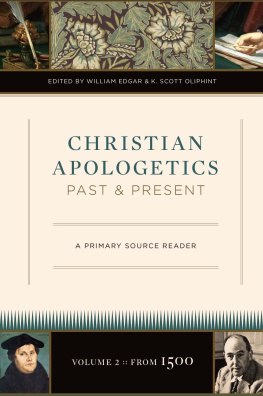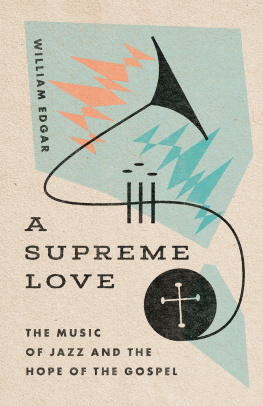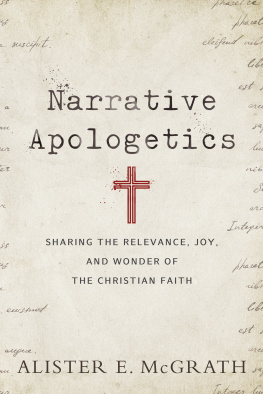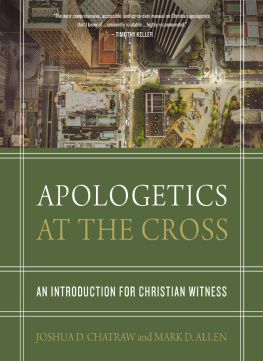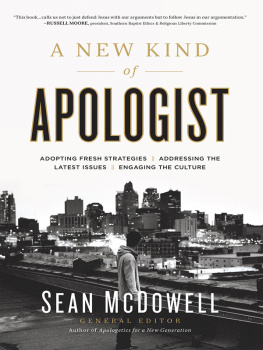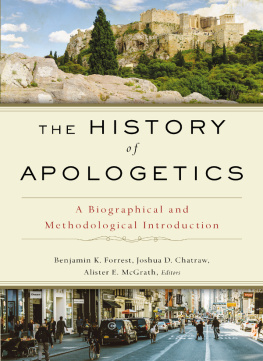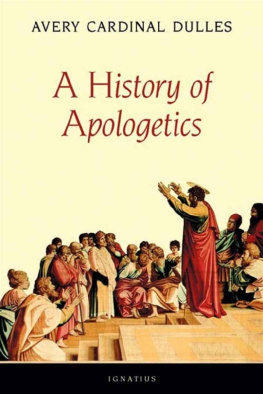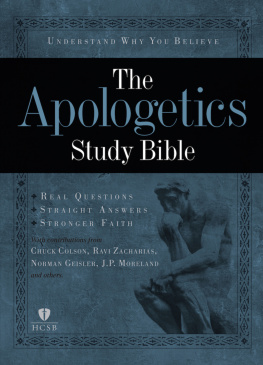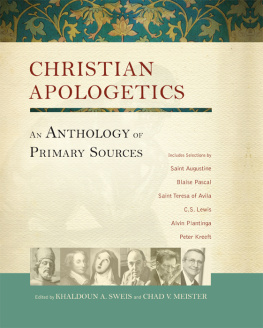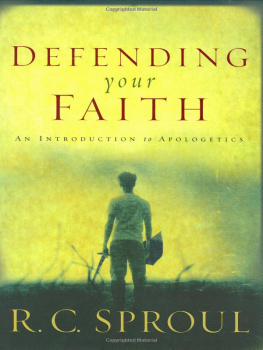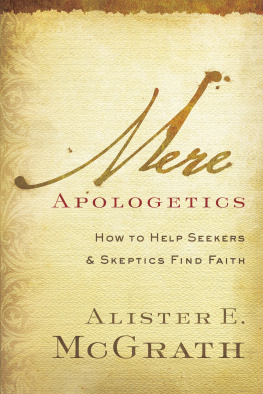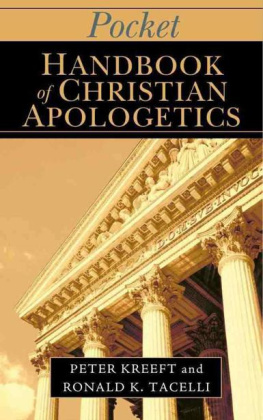The texts here assembled are classicsnot in the sense that they answer all legitimate questions about Christianity, but that, when they were written, they made their readers think hard about the faith, and that they continue to do so today. This is a most worthy collection.
Mark A. Noll, Francis A. McAnaney Professor of History, University of Notre Dame
This reader on the classical traditions of Christian apologetics is, to my knowledge, unmatched in basic compendia. It will equip and encourage thoughtful Christians to develop equally compelling defenses of the faith in our post-Enlightenment, post-Romantic, post-Postmodern era where global interdependencies plunge many into new varieties of suspicion, contempt, and hostility that demand reasonable and faith-filled encounter, dialogue, and debate.
Max L. Stackhouse, De Vries Professor of Theology and Public Life Emeritus, Princeton Theological Seminary
In an age of historical amnesia such as ours, nothing could be more helpful than to know how the church, in its long march through time, has addressed the opponents of Christian faith. This collection is superbly done and will bring much needed wisdom to our own times.
David F. Wells, Distinguished Senior Research Professor, Gordon-Conwell Theological Seminary
Bill Edgar, one of evangelicalisms most valued scholars and apologists, has given us in this work with Scott Oliphint a classic destined to be used for generations. I highly recommend it to all who are called to defend the faith.
Chuck Colson, Founder, Prison Fellowship
For years I have wanted a collection of primary sources in apologetics to use in my classes. Now we have an excellent one. Editors Edgar and Oliphint have made good choices in the selections used. A number of them are fascinating pieces rarely considered today, but very timely.
John Frame, J. D. Trimble Chair of Systematic Theology and Philosophy, Reformed Theological Seminary, Orlando
Understanding apologetics as explicating, affirming, and vindicating Christianity in the face of uncertainty and skepticism, Edgar and Oliphint have skillfully selected the best primary sources to introduce us to this ongoing task. Their work fills a gap in scholarly resources and highlights the strength, wisdom, and solidity of the prominent defenders of our faith.
J. I. Packer, Board of Governors Professor of Theology, Regent College
CHRISTIAN
APOLOGETICS
PAST AND PRESENT
Christian Apologetics Past and Present: A Primary Source Reader (Volume 2, From 1500)
Copyright 2011 by William Edgar and K. Scott Oliphint
Published by Crossway
1300 Crescent Street
Wheaton, Illinois 60187
All rights reserved. No part of this publication may be reproduced, stored in a retrieval system, or transmitted in any form by any means, electronic, mechanical, photocopy, recording, or otherwise, without the prior permission of the publisher, except as provided for by USA copyright law.
Cover design: Amy Bristow
Cover photo: National Portrait Gallery and Bridgeman Art Library
Interior design and typesetting: Lakeside Design Plus
First printing 2011
Printed in the United States of America
The volume editors' Scripture quotations are from the ESV Bible (The Holy Bible, English Standard Version), copyright 2001 by Crossway. Used by permission. All rights reserved.
Hardcover ISBN: 978-1-58134-907-8
ePub ISBN: 978-1-4335-3169-9
PDF ISBN: 978-1-4335-3167-5
Mobipocket ISBN: 978-1-4335-3168-2
Library of Congress Cataloging-in-Publication Data
Christian apologetics past and present : a primary source reader / William Edgar and K. ScottOliphint, eds.
p. cm.
Includes bibliographical references (p. ) and index.
ISBN 978-1-58134-906-1 (hc)
1. ApologeticsHistorySources. I. Edgar, William, 1944 II. Oliphint, K. Scott, 1955 III. Title. BT1109.C57 2009
Crossway is a publishing ministry of Good News Publishers.
TS 23 22 21 20 19 18 17 16 15 14 13 12 11
14 13 12 11 10 9 8 7 6 5 4 3 2 1
Contents
| 9 |
| 13 |
| 19 |
| 37 |
| 107 |
| 131 |
| 165 |
| 169 |
| 173 |
| 195 |
| 219 |
| 239 |
| 265 |
| 299 |
| 305 |
| 313 |
| 331 |
| 361 |
| 391 |
| 405 |
| 435 |
| 453 |
| 479 |
| 491 |
| 519 |
| 545 |
| 577 |
| 581 |
| 585 |
| 621 |
| 631 |
| 657 |
| 691 |
| 709 |
| 719 |
| 723 |
| 739 |
In the first volume of Christian Apologetics Past and Present we presented primary texts from the close of the apostolic age until the eve of the Reformation. Here we move from the Reformation to the present age. Because of the limitations of space, we could only choose a handful of texts from among the vast numbers available. Further, the cost of obtaining permission for the many publications not yet in the public domain makes republishing all of them prohibitive. As a compromise we have added to the fuller texts a series of follow-up sections, briefly describing some of the significant apologists we had to omit, with a list of their major writings for further study. We hope this will reassure those who will rightly wonder why we made certain selections, or why their favorite apologist was not always featured!
As in volume 1, we provide an introduction to each major historical section, and then each chapter introduces its featured author, highlighting any significant fact bearing on the person and the text. The texts themselves are virtually untouched, including now-unconventional punctuation, though quotation marks have been Americanized, and the ligatures and are rendered ae and oe to match modern typography. Headings in readings are modified in form for greater uniformity, but not in content. Diagnostic questions follow each text, to prompt reflection or discussion.
Like the first volume, this one can be used in a variety of ways. It is ideal for classes on the history of apologetics. It can also work well for discussion groups. But we trust it will also be used by individuals who need resources for their own work.
We want once again to express our thanks to Jeffrey Waddington for his willingness to gather all of the material and keep it in one format, and also for his brilliant spade work in tracking down texts and obtaining permissions from the publishers. We especially want to thank our wonderful editors at Crossway for their careful, patient guidance through the many choices we had to make, particularly because of the often unwieldy body of material we are presenting. Thom Notaros concern for both details and the whole is deeply appreciated.
We offer these pages with a due sense of humility, knowing how much more could have been done. But we also offer them with gratitude, knowing that the authors represented here surround us as a great cloud of witnesses, whose work deserves to be better known by those who have come after them.
The Reformation, Post-Reformation (Protestant), and Catholic Reformation

